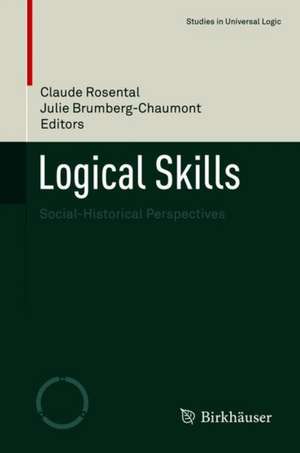Logical Skills: Social-Historical Perspectives: Studies in Universal Logic
Editat de Julie Brumberg-Chaumont, Claude Rosentalen Limba Engleză Hardback – 31 mar 2021
This contributed volume explores the ways logical skills have been perceived over the course of history. The authors approach the topic from the lenses of philosophy, anthropology, sociology, and history to examine two opposing perceptions of logic: the first as an innate human ability and the second as a skill that can be learned and mastered. Chapters focus on the social and political dynamics of the use of logic throughout history, utilizing case studies and critical analyses.
Specific topics covered include:
- the rise of logical skills
- problems concerning medieval notions of idiocy and rationality
- decolonizing natural logic
- natural logic and the course of time
Logical Skills: Social-Historical Perspectives will appeal to undergraduate and graduate students, as well as researchers in the fields of history, sociology, philosophy, and logic. Psychology and colonial studies scholars will also find this volume to be of particular interest.
Din seria Studies in Universal Logic
-
 Preț: 454.16 lei
Preț: 454.16 lei - 17%
 Preț: 365.02 lei
Preț: 365.02 lei -
 Preț: 386.81 lei
Preț: 386.81 lei - 15%
 Preț: 653.14 lei
Preț: 653.14 lei -
 Preț: 399.29 lei
Preț: 399.29 lei - 15%
 Preț: 581.47 lei
Preț: 581.47 lei -
 Preț: 397.38 lei
Preț: 397.38 lei - 15%
 Preț: 638.43 lei
Preț: 638.43 lei - 15%
 Preț: 643.99 lei
Preț: 643.99 lei -
 Preț: 395.85 lei
Preț: 395.85 lei -
 Preț: 406.05 lei
Preț: 406.05 lei -
 Preț: 384.09 lei
Preț: 384.09 lei -
 Preț: 389.11 lei
Preț: 389.11 lei - 15%
 Preț: 532.23 lei
Preț: 532.23 lei - 24%
 Preț: 802.17 lei
Preț: 802.17 lei - 15%
 Preț: 588.18 lei
Preț: 588.18 lei - 15%
 Preț: 592.12 lei
Preț: 592.12 lei - 18%
 Preț: 953.65 lei
Preț: 953.65 lei - 18%
 Preț: 1129.96 lei
Preț: 1129.96 lei - 15%
 Preț: 642.68 lei
Preț: 642.68 lei - 18%
 Preț: 782.10 lei
Preț: 782.10 lei - 18%
 Preț: 787.78 lei
Preț: 787.78 lei -
 Preț: 335.51 lei
Preț: 335.51 lei - 18%
 Preț: 1119.47 lei
Preț: 1119.47 lei
Preț: 697.32 lei
Preț vechi: 820.38 lei
-15% Nou
Puncte Express: 1046
Preț estimativ în valută:
133.43€ • 139.31$ • 110.43£
133.43€ • 139.31$ • 110.43£
Carte tipărită la comandă
Livrare economică 04-18 aprilie
Preluare comenzi: 021 569.72.76
Specificații
ISBN-13: 9783030584450
ISBN-10: 3030584453
Ilustrații: VIII, 172 p.
Dimensiuni: 155 x 235 mm
Greutate: 0.43 kg
Ediția:1st ed. 2021
Editura: Springer International Publishing
Colecția Birkhäuser
Seria Studies in Universal Logic
Locul publicării:Cham, Switzerland
ISBN-10: 3030584453
Ilustrații: VIII, 172 p.
Dimensiuni: 155 x 235 mm
Greutate: 0.43 kg
Ediția:1st ed. 2021
Editura: Springer International Publishing
Colecția Birkhäuser
Seria Studies in Universal Logic
Locul publicării:Cham, Switzerland
Cuprins
Introduction.- Part I. “Primitives” and Civilized Men.- Decolonizing “Natural Logic”.- Natural Logic, Anthropological Antilogies, and Savage Thought in the 19th Century.- Referring to Logical Skills to Assess the Rationality of an Ethnic Group: The Zande Case in the History of the Social Sciences.- “Some Stages of Logical Thought”: From Native Certainties to Acquired Doubts.- Part II. Educated and Disabled Men.- The Rise of Logical Skills and the 13th Century Origins of the “Logical Man”.- Anti-dialecticians in the Middle Ages: Historiographic Myth or Reality?.- Illogical Thinking: Problems Concerning Medieval Notions of “Idiocy” and “Rationality”.- Natural Logic and the Course of Time: From Theology to Developmental Psychology.- Index.
Recenzii
“History remains important within postcolonial STS. The Postcolonial Science and Technology Studies Reader (Harding, 2011), for example has numerous contributions by historians … . Logical skills shows that, to better understand the shared insights of postcolonial STS and STS itself, the sociological study of history is a fruitful approach.” (Maria Amuchastegui, Science & Technology Studies, Vol. 35 (3), 2022)
Notă biografică
Julie Brumberg-Chaumont, Research Professor - Centre National de la Recherche Scientifique (PSL/CNRS)
Claude Rosental, Research Professor - Sociology, Centre National de la Recherche Scientifique (CNRS)
Textul de pe ultima copertă
This contributed volume explores the ways logical skills have been perceived over the course of history. The authors approach the topic from the lenses of philosophy, anthropology, sociology, and history to examine two opposing perceptions of logic: the first as an innate human ability and the second as a skill that can be learned and mastered. Chapters focus on the social and political dynamics of the use of logic throughout history, utilizing case studies and critical analyses.
Specific topics covered include:
- the rise of logical skills
- problems concerning medieval notions of idiocy and rationality
- decolonizing natural logic
- natural logic and the course of time
Logical Skills: Social-Historical Perspectives will appeal to undergraduate and graduate students, as well as researchers in the fields of history, sociology, philosophy, and logic. Psychology and colonialstudies scholars will also find this volume to be of particular interest.
Caracteristici
Comprehensively examines two opposing conceptions of logical skills, allowing readers to approach logic from a new interdisciplinary, non-reductionist perspective Employs an interdisciplinary approach to explore the social and political issues raised by logic over the course of history Utilizes a clear and engaging style to present a socio-historical examination of logical skills that is accessible to students, researchers, and academics alike
